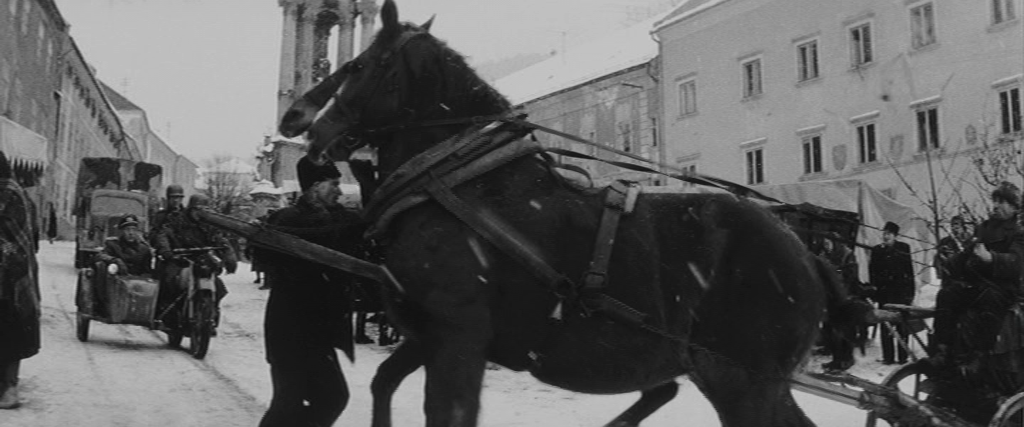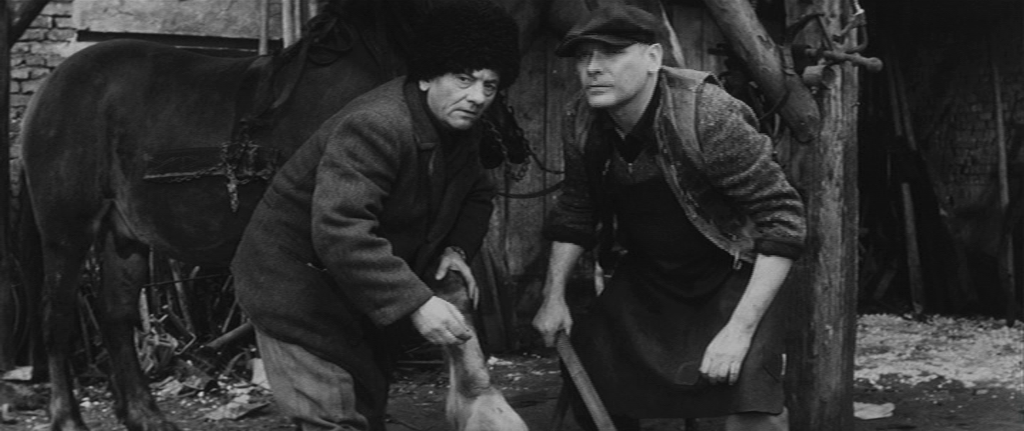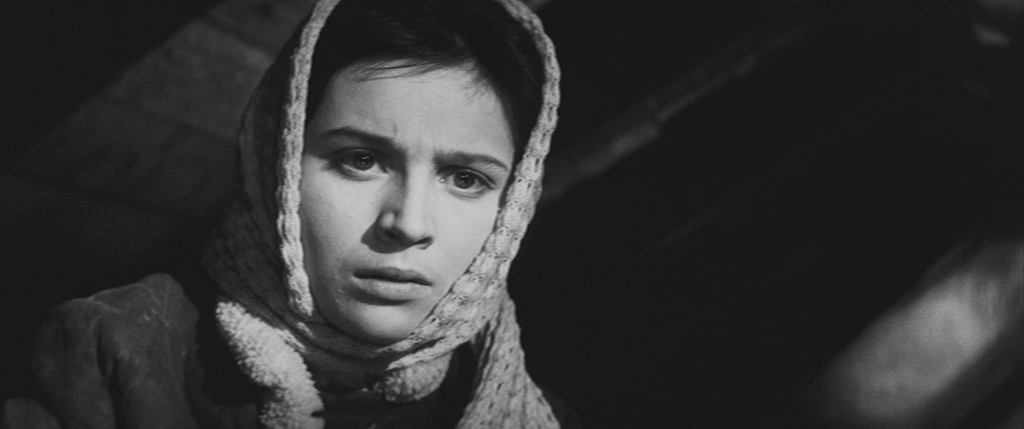Midnight Mass (1962)
Directed by Jiří Krejčík, is a 92-minute black-and-white drama based on a play by Peter Karvaš. Shot on 35 mm film and produced by the Slovak Film Studio in Bratislava.
"The conversation began reluctantly, but wine and the thieves’ cant of the family members helped ease the initial awkwardness. After dinner, naturally, we stayed at the table, and, following local custom, began playing cards, chatting over wine and coffee. Inevitably, the moment arrived when the guests and hosts engaged in passionate political discussions. That evening was memorable not only for what followed—a complete collapse and annihilation of a way of life—but also for another reason. It was one of those moments when people, guided as much by instinct as by intellect and information, sensed impending doom.
The guests and relatives present—save for one family member—were unmistakably anti-Nazi. However, all feared the end of the war, and cautious speculations were voiced in anxious tones about what the immediate future would hold. What would the frosty spring bring? How would the military situation develop? And what could the Hungarian people expect amid the cataclysm? The majority of the debaters agreed on one thing: no good could be expected."
(From Earth, Earth!... by Sándor Márai)
On Christmas Eve, when the extended family gathers annually around the old table, after a few glasses, we engage in conversations reminiscent of the above, though thankfully less ominous. The topics in recent years have remained the same: immigration, trans bathrooms, our identity, and, for nearly three years now, the Russian-Ukrainian war. People are fearful, and dozens of populist politicians have exploited this fear to build political capital. It is partly this artificially stirred-up fear that has led Europe—and the world with it—down a troubling path. The fractures cutting across nations may seem like a poor imitation of the great events of the last century, but division always stands out and hurts most when encountered within our own family.
The 1962 film Midnight Mass (Polnočná omša), like the original play, follows the small bourgeois life of the Kubiš family in December 1944. The head of the family, Valentin, is afraid to stand up to the fascists and their Nazi allies, such as Officer Brecker, whom the family is hosting in their home. The eldest son, Marián, joins the fascist militia, while his sister Angela has a lover—none other than Brecker himself. Her husband, Paľo, is a communist in hiding. The youngest son, Ďurko, is captured during the failed Slovak National Uprising. Though he escapes execution, he returns home injured, and on Christmas Eve, the tensions within the family reach a boiling point.
The film is a tragic probe into the everyday life of a fractured family, a stark reminder of where our seemingly stable world can end up if we forget to love and understand one another."
The guests and relatives present—save for one family member—were unmistakably anti-Nazi. However, all feared the end of the war, and cautious speculations were voiced in anxious tones about what the immediate future would hold. What would the frosty spring bring? How would the military situation develop? And what could the Hungarian people expect amid the cataclysm? The majority of the debaters agreed on one thing: no good could be expected."
(From Earth, Earth!... by Sándor Márai)
On Christmas Eve, when the extended family gathers annually around the old table, after a few glasses, we engage in conversations reminiscent of the above, though thankfully less ominous. The topics in recent years have remained the same: immigration, trans bathrooms, our identity, and, for nearly three years now, the Russian-Ukrainian war. People are fearful, and dozens of populist politicians have exploited this fear to build political capital. It is partly this artificially stirred-up fear that has led Europe—and the world with it—down a troubling path. The fractures cutting across nations may seem like a poor imitation of the great events of the last century, but division always stands out and hurts most when encountered within our own family.
The 1962 film Midnight Mass (Polnočná omša), like the original play, follows the small bourgeois life of the Kubiš family in December 1944. The head of the family, Valentin, is afraid to stand up to the fascists and their Nazi allies, such as Officer Brecker, whom the family is hosting in their home. The eldest son, Marián, joins the fascist militia, while his sister Angela has a lover—none other than Brecker himself. Her husband, Paľo, is a communist in hiding. The youngest son, Ďurko, is captured during the failed Slovak National Uprising. Though he escapes execution, he returns home injured, and on Christmas Eve, the tensions within the family reach a boiling point.
The film is a tragic probe into the everyday life of a fractured family, a stark reminder of where our seemingly stable world can end up if we forget to love and understand one another."
„A társalgás kedvtelenül indult, de bor, az ismerős emberek családi tolvajnyelve átsegített a kezdeti feszengésen. Vacsora után természetesen az asztalnál maradtunk, hazai szokás szerint tislizni kezdettünk, bor és fekete mellett beszélgettünk.
Most múlhatatlanul elérkezett a pillanat amikor a meghívottak és a háziak szenvedélyes politizálásba kezdettek. Ez az este nemcsak azért volt különös és maradt emlékezetes, ami utána következett – egy életforma teljes pusztulása, megsemmisülése volt a következmény –, hanem másképpen is. Megint egyszer olyan pillanat volt, amikor az emberek ösztöneikkel legalább úgy gyanítják a végzetet, mint értelmükkel és értesüléseikkel. A jelenlévő vendégek, rokonok - egy családtag kivételével - félreérthetetlenül náci ellenesek voltak. De a háború befejezésétől mind féltek, és aggódó hangnemben elhangzottak óvatos találgatások , milyen is lesz a közvetlen jövő. Mit hoz a fagyos tavasz, hogyan alakul a hadihelyzet, és mit várhat a magyarság a kataklizmában. A vitatkozók többsége megegyezett az aggodalomban, hogy semmi jót nem várhatunk.”
Föld, Föld!... (Márai Sándor)
Szenteste, amikor a nagycsalád évente összeül, a régi asztal fölött, pár pohár után, az idézethez hasonló, örömünkre kevésbé vészjósló beszélgetésbe kezdünk. A témák az utóbbi években ugyanazok: bevándorlás, a trans toalett, az identitásunk és lassan már harmadik éve az orosz-ukrán háború. Az ember fél és a populista politikusok tucatjai érezték meg ezt a félelmet és kovácsoltak belőle politikai tőkét. Részben e mesterségesen gerjesztett félelem az oka, hogy Európa és vele a világ éppen, egy aggasztó fordulatot vesz. A nemzeteken átívelő törésvonal a múlt évszázad nagy történéseinek egy ócska másolatának tűnhet, de a megosztottság mindig akkor tűnik szembe és fáj leginkább, mikor saját családunkban találkozunk vele.
A Polnočná omša (1962) című film, ahogy az eredeti színdarab is, a Kubiš család kis burzsoá életét követi 1944 december haván. A család feje, Valentin, fél keresztbe tenni a fasisztáknak és náci szövetségeseiknek, mint például Brecker tisztnek, akit a család a házában szállásol. A legöregebb fiú, Marián, a fasiszta gárdistákhoz szegődik, Angela testvére szeretőt tart, aki nem más, mint maga Brecker, férje Paľo pedig rejtőzködő kommunista. A legfiatalabb fiútestvér, Ďurko, fogságba esik a szétvert szlovák nemzeti felkelésben. Bár sikerül megmenekülnie a meszes gödör elől, sérülten kerül haza,így szenteste a családi fészekben kiéleződnek a konfliktusok.
A film egy tragikus szonda egy szétzilált család mindennapjaiba, emlékeztetőül, hová juthat stabilnak hitt világunk, ha elfelejtünk szeretni és megérteni.













